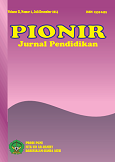PENERAPAN PERAN DAN FUNGSI GURU DALAM KEGIATAN PEMBELAJARAN
DOI:
https://doi.org/10.22373/pjp.v9i2.9087Keywords:
Role, Teacher Functions, Learning ActivitiesAbstract
In learning activities the teacher should have a sufficiently mature teaching plan. Teaching planning is closely related to various elements such as teaching objectives, teaching materials, learning activities, teaching methods and evaluation. These elements are an integral part of the overall responsibility of the teacher in the learning process. The role and function of teachers is one of the most important teacher qualifications. If creativity and competence are not present in a teacher, he will not be competent in doing his job and the results will not be optimal. With their creativity and competence, apart from mastering the material and being able to process teaching and learning programs, teachers are also required to be able to carry out evaluation and administration. The ability of teachers to develop the learning process and their mastery of teaching materials is not sufficient. The teacher's ability to master the class is balanced with the ability to evaluate student competency planning which is very decisive in the context of subsequent planning, or the treatment policy for students related to the concept of complete learning, therefore the function and role of the teacher in planning and implementing the learning process is a major factor. in achieving learning objectives. The skills to plan and implement this learning process are closely related to the duties and responsibilities of the teacher as an educating teacher. Teachers as educators have a very broad meaning, not just providing teaching materials, but reaching out to ethical and aesthetic behavior in facing the challenges of life in society.
References
Dede Rosyada, Paradigma Pendidikan Demokratis; Sebuah Model Pelibatan Masyarakat dalam Penyelangaraan Pendidikan, (Jakarta: Prenada Media, 2004).
E. Mulyasa, Standar Kompetensi Sertifikasi Guru, (Bandung : PT. Remaja Rosda Karya, 2007)
Kunandar, Guru Profesional; Implimentasi Kurikulum Tingkat Satuan Pendidikan dan Sukses dalam Sertifikasi Guru, (Jakarta: PT Rosda Karya, 2008)
Moch. Uzer Usman, Menjadi Guru Profesional, (Bandung: PT. Rosdakarya, 2005)
Muhaimin Abdul Mujib, Pemikiran Pendidikan Islam Kajian Filosofis dan Kerangka dasar Operasional, (Bandung: Trigenda Karya, 2005)
M.Arifin, Kapita Selekta Pendidikan Islam, (Jakarta: Bulan Bintang, 1999)
Nana Sudjana, Dasar-Dasar Proses Belajar Mengajar, (Bandung: Sinar Baru, 1989)
Oemar Hamalik, Pendidikan Guru Berdasarkan Pendekatan Kompetensi, (Jakarta: Bumi Aksara, 2006)
Roestiyah. N.K, Masalah-Masalah ilmu Keguruan, (Jakarta: PAU-PAI, Universitas Terbuka, 2001)
Subari, Supervisi Pendidikan, (Jogjakarta: Bumi Aksara, 2004)
Tobrani, Pendidikan Islam Paradigma Teologis, Filosofis dan Spiritualitas, (Malang: UMM Pres, 2010)
Wina Sanjaya, Perencanaan dan Desain Sistem Pembelajaran, (Jakarta: Prenada Media, 2009)
Zakiah Daradjat, Ilmu Pendidikan Islam, (Jakarta: Bulan Bintang, 2002)
_____________, Pendidikan Islam dalam Keluarga dan Sekolah, (Jakarta: Ruhama, 2001)
Rijal, F. (2018). Guru profesional dalam konsep kurikulum 2013. Jurnal MUDARRISUNA: Media Kajian Pendidikan Agama Islam, 8(2), 328-346.
Oviana, W., & Rijal, F. (2021). The Role of Islamic Higher Education Institution in Developing Students' Character Value. AL-ISHLAH: Jurnal Pendidikan, 13(1), 570-580.
Downloads
Published
Issue
Section
License
- Authors retain copyright and grant the journal right of first publication with the work simultaneously licensed under a Creative Commons Attribution License that allows others to share the work with an acknowledgment of the work's authorship and initial publication in this journal.
- Authors are able to enter into separate, additional contractual arrangements for the non-exclusive distribution of the journal's published version of the work (e.g., post it to an institutional repository or publish it in a book), with an acknowledgment of its initial publication in this journal.
- Authors are permitted and encouraged to post their work online (e.g., in institutional repositories or on their website) prior to and during the submission process, as it can lead to productive exchanges, as well as earlier and greater citation of published work (See The Effect of Open Access).

